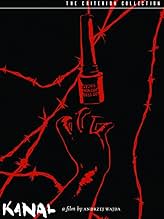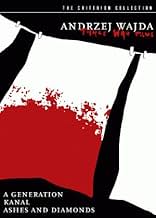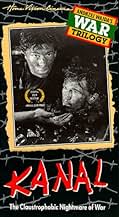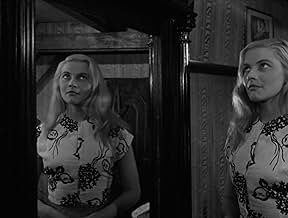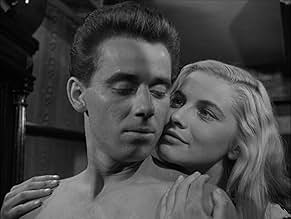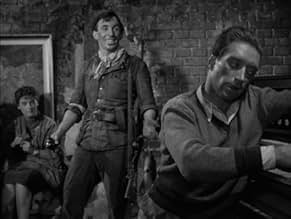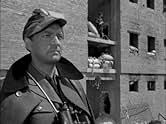AVALIAÇÃO DA IMDb
7,9/10
8,4 mil
SUA AVALIAÇÃO
Em 1944, durante a revolta de Varsóvia contra os nazistas, o tenente polonês Zadra e seus combatentes da resistência usam o sistema de esgoto de Varsóvia para escapar do cerco alemão.Em 1944, durante a revolta de Varsóvia contra os nazistas, o tenente polonês Zadra e seus combatentes da resistência usam o sistema de esgoto de Varsóvia para escapar do cerco alemão.Em 1944, durante a revolta de Varsóvia contra os nazistas, o tenente polonês Zadra e seus combatentes da resistência usam o sistema de esgoto de Varsóvia para escapar do cerco alemão.
- Direção
- Roteirista
- Artistas
- Indicado para 1 prêmio BAFTA
- 1 vitória e 2 indicações no total
Vladek Sheybal
- Composer Michal
- (as Wladyslaw Sheybal)
Wlodzimierz Bednarski
- Insurgent
- (não creditado)
Zenon Dadajewski
- Insurgent
- (não creditado)
Avaliações em destaque
That this movie was made is a near miracle, since it squeaked out barely 3 years after Stalin died; and the Polish film industry could even begin to suggest that Poles could struggle against the Germans without Soviet "fraternal" help. It looks likely that it was saved from oblivion by the Silver Palm (1957), at least in Poland. My suspicion that this got past the Party censors as a Dantean allegory about the worker and peasant struggles, with each character and episode exposing some lesson. However, like Ashes and Diamonds, much of the real message is just at the surface: regular Poles struggling for a better future.
The real hidden message of the film is a metaphorical struggle against Soviet oppression. Wajda seems to suggest this by quoting Szczepanski(1944): "... But know this: from our tombstones A victorious new Poland will be born And you will not walk this land You Red Ruler of bestial forces!" (1) Indeed the resolution suggests the Stalinist Inferno is far from over. Those who have tried to bring light to the world suffer a Promethean fate.
What seems remarkable to me is the positive spirit, humor, and love of life that most of the characters display in the face of their passage into the underworld. There is additional irony (humorous to me), for example, that the composer attempts to play a particularly patriotic Chopin, but is then ordered to play "something with feeling:" an inane dance tune. (By the way, the Beckstein piano that the composer tries to protect was made by a company that provided Hitler with crucial early support.)
It is also remarkable that such a dark, almost anti-heroic view of combatants was made only 12 years after the event. It is not so far from the spirit of Ernie Pyle, and just think how long it took to make Band of Brothers.
(1) Interview on www.wajda.pl
The real hidden message of the film is a metaphorical struggle against Soviet oppression. Wajda seems to suggest this by quoting Szczepanski(1944): "... But know this: from our tombstones A victorious new Poland will be born And you will not walk this land You Red Ruler of bestial forces!" (1) Indeed the resolution suggests the Stalinist Inferno is far from over. Those who have tried to bring light to the world suffer a Promethean fate.
What seems remarkable to me is the positive spirit, humor, and love of life that most of the characters display in the face of their passage into the underworld. There is additional irony (humorous to me), for example, that the composer attempts to play a particularly patriotic Chopin, but is then ordered to play "something with feeling:" an inane dance tune. (By the way, the Beckstein piano that the composer tries to protect was made by a company that provided Hitler with crucial early support.)
It is also remarkable that such a dark, almost anti-heroic view of combatants was made only 12 years after the event. It is not so far from the spirit of Ernie Pyle, and just think how long it took to make Band of Brothers.
(1) Interview on www.wajda.pl
Watching Andrzei Wajda's war movie 'Kanal' one is stuck just by how short the interval was between the making of this film and the horrors it depicts. And while there were plenty of British and American war films made in the 1950s, it was perhaps easier to turn "our" story into the black-and-white banality of heroic fable, besides which, "we" could also make movies without communist censors looking over our shoulders. Wajda here chooses to fashion a tale centred on the collapse of the Polish resistance to the Nazis: the last survivors take to the sewers, the Germans pump gas down, and you know as soon as the film starts that there will be no happy endings, even for the survivors. It's a tale whose laconic nihilism would be remarkable in any era: I was reminded of the (much later) BBC nuclear-themed drama 'Threads', another tale of underground life facing extinction, while the dialogue, stoical in the face of impossible fate, offers more direct echos, for it made me think of the films of another Polish master, Krystoff Kieslowski. The most remarkable things in this film are the poetically bleak sequence of scenes that end it; it's biggest failing is the score, that (as with many films of this era) feels the need to describe the plot, and not merely to complement it. Occasionally other aspects of the movie also give away its age, but what's much more notable is the modernity (and hopelessness) of its approach to its material. A fine achievement, dating from an era when the events it portrayed were the present, not the past.
10tutusaad
I saw this film in a film festival in Dhaka, in early sixties(Now Bangladesh, then East Pakistan). For me as a student, Sattayjit Ray's Apu trilogy was my only exposer to any kind of art film then. Visual realism was a new thing for us in Indian sub continent. Audience were so spellbound that they could smell sewage sitting in the cinema hall. I think like all great directors, Wajda had the cinematographic sense to create that environment where viewers reality could blend with creative fiction. In post war period of late forties and in early fifties like the School of Polish Posters, all creative mediums went through this fatalistic phase. It was grotesque but realistic.
10begger
In many respects this movie is sheer brilliance. For starters "Kanal" describes the entire Polish Revolt in a single instance at the eve of its termination. But this movie is much more than a parable of Revolution and struggle. "Kanal" has great characters, great settings, great scenes, and, above all, an important message to be told.
What would it be like to fight an impossible battle against a larger force and be in the real world? What would it be like to face death at every turn and still travel on knowing defeat awaited you at the next bend? "Kanal" is the answer to these questions.
What would it be like to fight an impossible battle against a larger force and be in the real world? What would it be like to face death at every turn and still travel on knowing defeat awaited you at the next bend? "Kanal" is the answer to these questions.
10info-399
A great film, at first viewing people may not understand some of the cultural references. The tall blonde brave sewer-runner is not a model of Aryan Uber Womanhood but that of a strong polish woman.According to the official line of Nazi Propaganda the metaphor for the Aryan woman was of a breeder , home maker not a woman that would take a pro-active role in dragging aman half way across the canals of Warsaw. I saw the movie as less of a metaphor for hell as that of an actual hell,the hell of siege such as stalingrad. Stalingrad was not a metaphor for hell it was hell on earth. As was Warsaw in the last days of organized rebellion.As much as Das Boot style brought across a sliver of the real life incident , Kanal's style brings across the desperation of the struggle in Warsaw. The optomistic saddness can be written off as slavic melancholy, or better described as the hope and sorrow of a nation that has many times been routed from the map of europe only to resurface strong and proud.Everything was taken from them and hope itself is in question as the final reel fades to black.
Você sabia?
- CuriosidadesDirector Andrzej Wajda was himself a fighter in the Polish resistance movement against the Nazis in World War II and several scenes in the film were based on his experiences.
- Erros de gravaçãoWhen Korab is attacking Goliath self-propelled tracked mine, a wire pulling it can be seen.
- Citações
Narrator: These are the tragic heroes: watch them closely in the remaining hours of their lives.
Principais escolhas
Faça login para avaliar e ver a lista de recomendações personalizadas
- How long is Kanal?Fornecido pela Alexa
Detalhes
- Data de lançamento
- País de origem
- Central de atendimento oficial
- Idiomas
- Também conhecido como
- Canal
- Locações de filme
- Empresa de produção
- Consulte mais créditos da empresa na IMDbPro
- Tempo de duração1 hora 31 minutos
- Cor
- Mixagem de som
- Proporção
- 1.37 : 1
Contribua para esta página
Sugerir uma alteração ou adicionar conteúdo ausente


